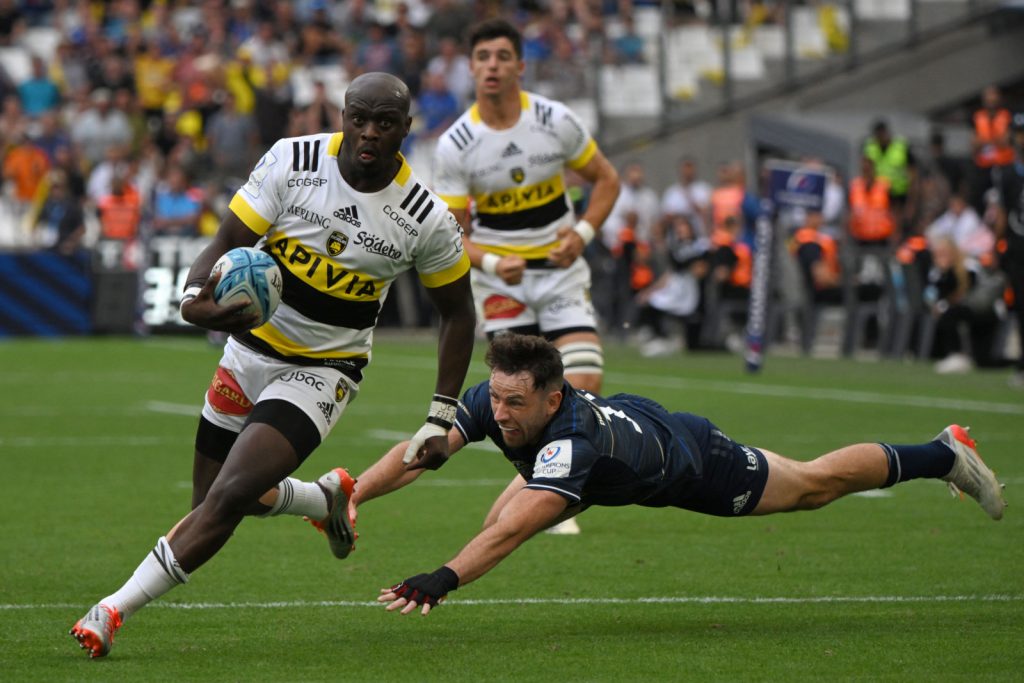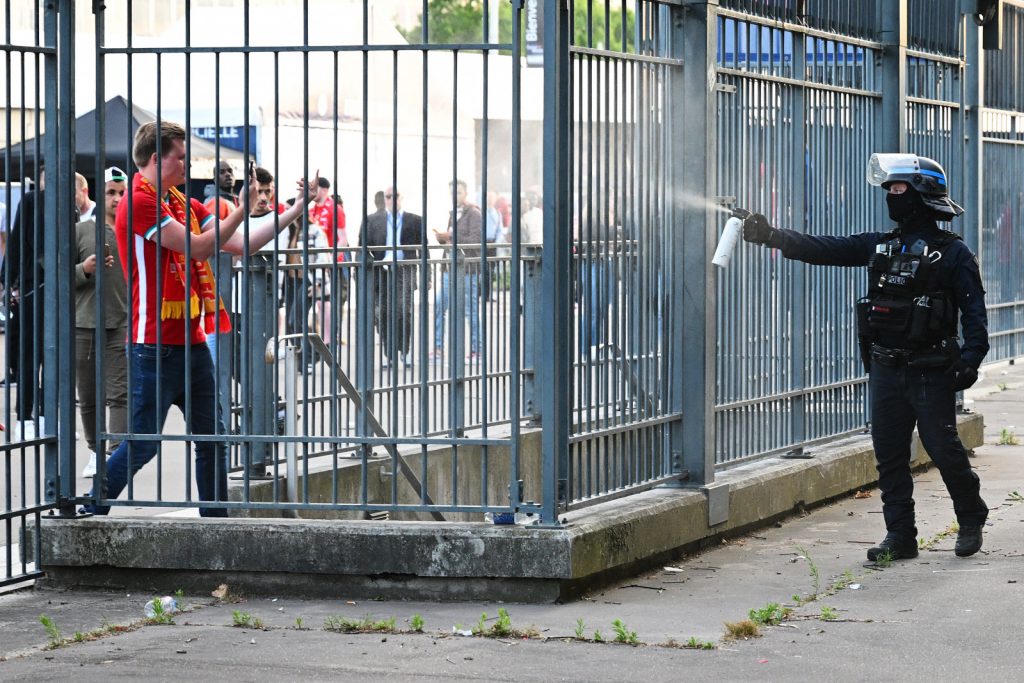Dany Priso of La Rochelle, celebrates after their victory during the Heineken Champions Cup Final match between Leinster Rugby and La Rochelle at Stade Velodrome on May 28, 2022 in Marseille, France. (Photo by David Rogers/Getty Images)
France. A country of two halves, to tweak a sporting cliché.
Rugby, in Marseille. Football, in Paris.
The two big European Cups. The big European Cups – with disproportionate global cachet.
A great deal to play for: huge prestige, not to mention the financial stakes.
In one, La Rochelle versus Leinster; the petite West French coastal town versus the Irish National Team, more or less, including the great fly half, Johnny Sexton.
La Rochelle are not quite the country bumpkins they might appear. Not only was this their second European Champions Cup final in row (although they lost the last one), but they boast an array of internationals, including a couple of Springboks — Dylan Leyds and Raymond Rhule, who scored a brilliant first try after 10 minutes, almost completely against the run of play.
 La Rochelle’s South African wing Raymond Rhule avoids a tackle and runs to score during the European Rugby Champions Cup, rugby union final between Stade Rochelais (La Rochelle) and Leinster at the Velodrome Stadium in Marseille, southeastern France, on May 28, 2022. (Photo by NICOLAS TUCAT / AFP) (Photo by NICOLAS TUCAT/AFP via Getty Images)
La Rochelle’s South African wing Raymond Rhule avoids a tackle and runs to score during the European Rugby Champions Cup, rugby union final between Stade Rochelais (La Rochelle) and Leinster at the Velodrome Stadium in Marseille, southeastern France, on May 28, 2022. (Photo by NICOLAS TUCAT / AFP) (Photo by NICOLAS TUCAT/AFP via Getty Images)
Yet, thereafter Leinster’s grit and savvy seemed as if it would be enough to prevail. And it was only in the very last minute of this hard fought match — one that might well have infuriated purists who would have hoped for more “running rugby” — that victory was seized.
It was competitive sport at its finest. One minute left on the clock. The French team 17-21 down, but encamped on their opponents’ line — which is precisely where they had been for much of the preceding 10 minutes, causing untold pain and suffering to La Rochelle fans.
Even though it was clearly a high-quality encounter befitting of a final of a high-quality tournament, until that moment, and what followed immediately after, this lowly newspaper man (to coin a phrase) was very seriously questioning the wisdom of his choice of La Rochelle over a seat in the press box in the Stade de France in Paris.
The author takes in the La Rochelle vibes.
But then there was a final drive for the line. There had been a similar long passage of play in the final phase of the first half and La Rochelle had failed to take advantage. Sitting alongside life-long La Rochelle fans, desperate with eager anticipation, one feared for the worst.
If Lady Bracknell had been present, which regrettably she was not, she might have pointed out that “To lose one may be regarded as a misfortune, to lose two looks like carelessness.”
Whether the same thought was reverberating through the minds of La Rochelle supporters is probably very much open to doubt. But, it was a thought that should very probably have occurred to the assembled ranks of Liverpool fans later in the evening 600km to the north as chance after chance went begging in the Uefa Champions League final, leaving the way open for Real Madrid to plunge the knife into the heart of Liverpool with their single on-target shot of the game.
But football can wait, for once. Because in Marseilles, Artur Retiere had artfully dodged the final, resolute line of Irish defence to in one extraordinarily deft move that both circumnavigated the Leinster full back’s arm and body, and then lawfully slid the ball onto the try line, secured a famous victory.
The clock showed 78 minutes and some seconds. By the time the conversion kick was plonked between the posts the 80-minute siren had sounded. The game was up.
What perfect drama.
Imagine Gqeberha winning the biggest club trophy in the world. No, wait, that’s not a good comparison. The city formerly known as PE has around a million residents, more than 10 times La Rochelle’s 75 000. East London? Same thing. Saldanha — a better comparator: similar Atlantic breezes and vast quantities of fine oysters.
Quite an achievement. Which justified a decent celebration. And, on closer inspection, the charming portside harbour waterfront was packed with jubilant fans waving the yellow flags of the victors.
For years, the towns-people have been threatening to throw themselves off the quay in the unlikely event that they won. And now they had. And off they threw themselves. But with a squadron of firemen in a waiting dingy, just in case.
The sky was blue. There was a not a cloud or a mask in sight. In continental Europe the pandemic is in the rear view mirror, and the shadow of the war in Ukraine has for the time-being receded. Life is good and there is in any case little reason to delay a good party, especially when such a damn fine reason should present itself.
No arrests and no need for any pepper spray, still less, tear gas. All was right with the world on the West Coast, and for good reason.
If only one could say the same about St Denis and the Stade de France. From light to shade; from the best of France to the very worst in just an hour or two.
This has absolutely nothing to do with the football. A great team was beaten by a team that knows how to win, and wins by knowing when the big moments in a game come along.
If ever there was a cup that had the name of the winners etched on it weeks ahead of time it was this one. Real had dragged victory from the hands of defeat in successive rounds against PSG, Chelsea and Manchester City.
Their French centre-forward, Karim Benzema, was the embodiment of Real Madrid’s resilience; all bustling energy and disruption.
Benzema is to football what Berlin is to world cities — the most beautiful and the ugliest.
What he lacks in elegance he more than makes up for guile and pragmatic effectiveness. He knows when the moment comes and he rarely misses the moment.
He is as streetwise as they come.
In contrast, in La Rochelle there was the sweet innocence of a first, golden triumph. In Paris, there were two clubs who, between them, have contested 25 European Cup finals (winning 20 of them). They are the very opposite of sweet innocence.
But that is not the real point that needs to be made here. Because, as ever with football, it was the events off the field that mattered more, though they would have gone largely unnoticed by the great majority of TV-watching billions across the world.
Switching on to DSTV, for example, viewers would have been met with charming visuals of a gloriously manicured pitch and an apparently immaculate stadium, sun-kissed in the late May evening. And then by the news of an “unfortunate” delay in the kick-off, which ultimately extended to half an hour — time enough, by the way, for this lowly newspaperman to return from the throbbing festivity of the West Coast portside to his television-watching berth.
In turn, this would have been “reported”’ by the non-reporting, non-journalists of the mega-event sporting commentariat as “regrettable”, without any provision of context or on-the-ground reportage.
But outside the Stade de France thousands of fans, mostly Liverpool supporters, were having their dream night turned into a nightmare, experiencing a very differently granular view of the final.
 Police spray tear gas at Liverpool fans outside the stadium as they queue prior to the UEFA Champions League final match between Liverpool FC and Real Madrid at Stade de France on May 28, 2022 in Paris, France. (Photo by Matthias Hangst/Getty Images)
Police spray tear gas at Liverpool fans outside the stadium as they queue prior to the UEFA Champions League final match between Liverpool FC and Real Madrid at Stade de France on May 28, 2022 in Paris, France. (Photo by Matthias Hangst/Getty Images)
The “system” of security checks was painfully inadequate, causing a huge build-up of fans, who, increasingly, and understandably restless, pressed and pressed. Inevitably, that first ring was then abandoned and still greater pressure was placed on the turnstiles, of which there was simply not enough to cope with the numbers.
With appalling heavy-handedness, police pepper-sprayed or tear-gassed many of the fans, often for no good reason. The victims should get lawyers and sue for assault. The police perpetrators should be held to account. There is no justification for what took place.
The evidence of this is available to all, thanks to social media; first-hand accounts.
The French authorities are responsible — just as they were in 2006, the last time the Uefa Champions League was played in Paris, also at the Stade de France. The same thing happened then. Inadequate staffing or system; a dangerous build-up of fans, as a consequence. Thousands being squeezed to the point of fearing for their lives. Only two turnstiles open out of 10 in one section of the ground.
I know because I was there. This time it was just the same, as Exhibit B from last week’s column (Dr Gary Kendall) attested to me the next day; he arrived at St Denis three hours before kick-off, but it took him close to two hours to get in, because of the inefficiency and incompetence on display. It sickened him, as it would anyone, especially a Liverpool fan with a deep connection with the tragedy of Hillsborough.
Yet, as someone said to him, “European Cup Finals are always the same”. There is zero institutional memory. Why? Because the footballing authorities really don’t care. Uefa is primarily to blame. It is the governing authority. And it starts with the allocation of tickets — too many to people who have no authentic attachment to the clubs competing, meaning that thousands of real fans are desperate for tickets and will do almost anything to get it, while fuelling a gruesome “black market”.
The real fans get pushed out or aside. No one cares about them; they are treated as cattle or, more aptly, as cannon fodder for vicious and cack-handed security “services”.
At least in La Rochelle, lifetime La Rochelle fans were having the time of their lives, undisturbed by institutional cruelty.
It was a day on which one could see the best and worst of France. And the best and worst of modern sport. Pride and shame, glory and ill repute, all in one sunny early summer’s day. Though, for perspective’s sake, if one listened carefully one could still just about hear the drums of war 3 000km away to the East.